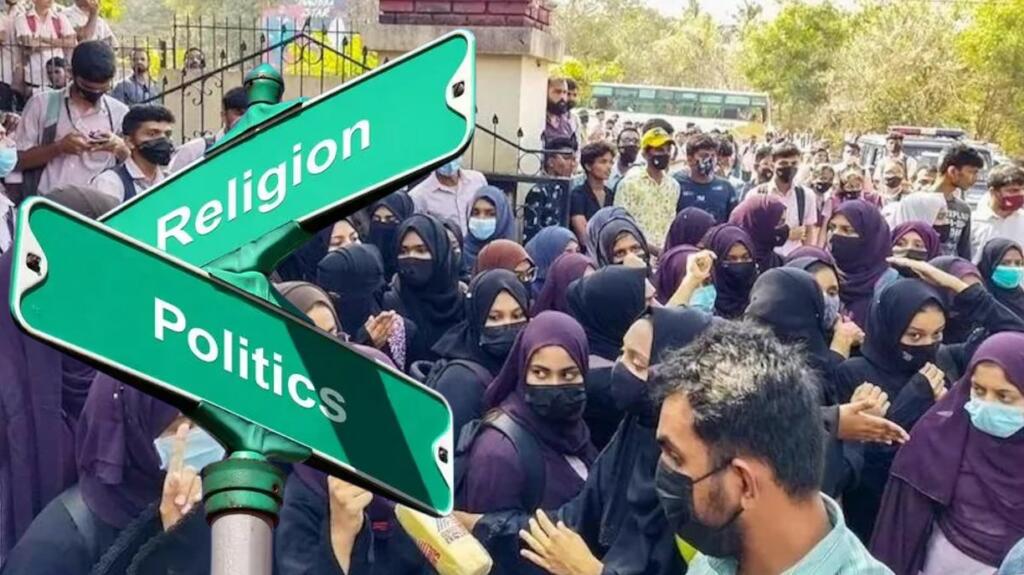Indira Gandhi, former Prime Minister of India had inserted the word ‘secular’ in our Constitution. But the ‘secular’ India is today a victim of Political Islam and the Hijab Movement of Karnataka is an evident deposition of that. In India, Islam has been politicised and the followers of Islam have been appeased for political benefits. There is an urgent need to eradicate political Islam from India, which is only possible through the government’s tough steps.
Read More: Is Hijab actually liberating? An Anthropological and Genealogical take
Hijab Movement: Islamism stamps its foot in educational institutions
We are today in a physically growing world and every human being is keen to learn and grow. But the practitioners of Islam prioritise their religious practices above everything.
The Karnataka Hijab movement is clear evidence of the same. Hijab being compulsory practice in Islam is a debatable question, but there should be no question when one has to choose between Hijab and Kitaab (Studies).
Also Read: From ice-cream wrappers to rapes, here are some of the weirdest excuses for hijabs
The ruckus on this issue simply points towards how Political Islam is stamping its presence in educational institutions.
Secular India: A victim of ‘Fatwa Politics’
The minority community of India, i.e., Muslims have been turned into a vote bank by political parties like Congress, Samajwadi Party, and others through appeasement and tokenism. And Rajiv Gandhi’s stance on Shah Bano’s case proves that.
Is it doing good? Well, yes for the political parties. But this kind of politics has done no good to the nation. Because all this appeasement and tokenism of the Muslim community has given birth to ‘Fatwa Politics.’
Fatwas slowly strolled into the domain of Indian Politics. From which leader to elect to which party to vote for, everything was decided by Fatwas from Masjids. This in turn abstained the whole community from growth.
India saw the rise of Bukhari and Deoband, who hijacked Islam and presented its politicised form instead.
Political Islam and its phases
When we look at a global picture, it realises that Political Islam has gone through two phases and is currently in its third phase. India has not been untouched by this evolution. The first phase began in the 19th century when Western imperialism overpowered Islam. The second phase in the next century was characterized by growing voices of dissent against the dictators. The third phase began with the collapse of the Soviet Union. This also led to an uprising of the Arab Spring around 2010.
Surgical Strike on Political Islam
The dynamics of Indian Politics saw a massive drift around 2013-14 when ‘Nationalism’ was brought at the centre stage. The Bhartiya Janata Party discarded the Congress’ policy of Muslim appeasement, just like the older BJP government. This in turn consolidated the majority Hindu votes and Narendra Modi was voted to power.
Also Read: Arif Mohammad Khan makes it clear that Hijab is not compulsory in Islam
Political Islam that was at a disillusioned state in India saw a revival in the wake of the Hijab Movement. The Islamists along with the Liberals have been politicizing the issue. While doing this, they forget that the countries that have made Hijab a necessity, showcase a deteriorating status of women. And this is the correct time to crush Political Islam and take Cultural Islam to the masses.
Radical Islamist organizations like PFI have been igniting issues like Hijab Movement to seek revival. And organizations like these need a blanket ban.
Also Read: True culprits behind the Hijab row are out
The politicization of Islam is a dangerous phenomenon. Mohammad Ali Jinnah, who was far away from the orthodox Muslim faith himself carved out a nation by using the Islamic card.
India and New Delhi now need to send a clear message that only those will be tolerated in this new India who abide by the idea of India and adhere to the idea of democracy.
